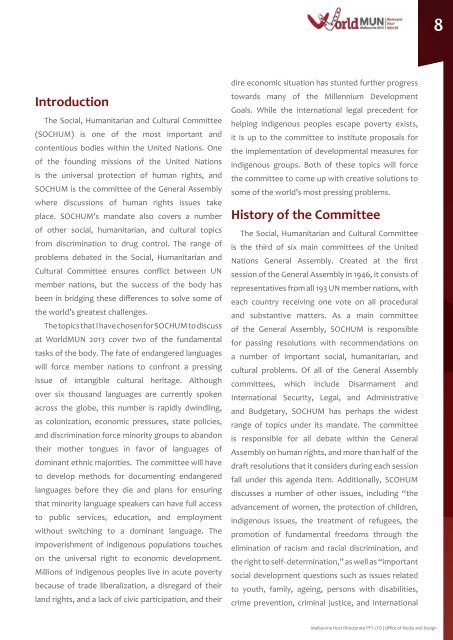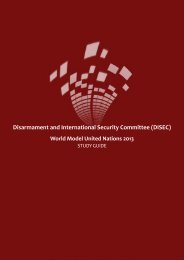Social, Humanitarian and Cultural Committee (SOCHUM)
Social, Humanitarian and Cultural Committee (SOCHUM)
Social, Humanitarian and Cultural Committee (SOCHUM)
Create successful ePaper yourself
Turn your PDF publications into a flip-book with our unique Google optimized e-Paper software.
Introduction<br />
The <strong>Social</strong>, <strong>Humanitarian</strong> <strong>and</strong> <strong>Cultural</strong> <strong>Committee</strong><br />
(<strong>SOCHUM</strong>) is one of the most important <strong>and</strong><br />
contentious bodies within the United Nations. One<br />
of the founding missions of the united Nations<br />
is the universal protection of human rights, <strong>and</strong><br />
<strong>SOCHUM</strong> is the committee of the General Assembly<br />
where discussions of human rights issues take<br />
place. <strong>SOCHUM</strong>’s m<strong>and</strong>ate also covers a number<br />
of other social, humanitarian, <strong>and</strong> cultural topics<br />
from discrimination to drug control. the range of<br />
problems debated in the <strong>Social</strong>, <strong>Humanitarian</strong> <strong>and</strong><br />
<strong>Cultural</strong> <strong>Committee</strong> ensures conflict between UN<br />
member nations, but the success of the body has<br />
been in bridging these differences to solve some of<br />
the world’s greatest challenges.<br />
The topics that I have chosen for <strong>SOCHUM</strong> to discuss<br />
at WorldMUN 2013 cover two of the fundamental<br />
tasks of the body. The fate of endangered languages<br />
will force member nations to confront a pressing<br />
issue of intangible cultural heritage. Although<br />
over six thous<strong>and</strong> languages are currently spoken<br />
across the globe, this number is rapidly dwindling,<br />
as colonization, economic pressures, state policies,<br />
<strong>and</strong> discrimination force minority groups to ab<strong>and</strong>on<br />
their mother tongues in favor of languages of<br />
dominant ethnic majorities. The committee will have<br />
to develop methods for documenting endangered<br />
languages before they die <strong>and</strong> plans for ensuring<br />
that minority language speakers can have full access<br />
to public services, education, <strong>and</strong> employment<br />
without switching to a dominant language. the<br />
impoverishment of indigenous populations touches<br />
on the universal right to economic development.<br />
Millions of indigenous peoples live in acute poverty<br />
because of trade liberalization, a disregard of their<br />
l<strong>and</strong> rights, <strong>and</strong> a lack of civic participation, <strong>and</strong> their<br />
dire economic situation has stunted further progress<br />
towards many of the Millennium Development<br />
Goals. While the international legal precedent for<br />
helping indigenous peoples escape poverty exists,<br />
it is up to the committee to institute proposals for<br />
the implementation of developmental measures for<br />
indigenous groups. Both of these topics will force<br />
the committee to come up with creative solutions to<br />
some of the world’s most pressing problems.<br />
History of the <strong>Committee</strong><br />
The <strong>Social</strong>, <strong>Humanitarian</strong> <strong>and</strong> <strong>Cultural</strong> <strong>Committee</strong><br />
is the third of six main committees of the united<br />
Nations General Assembly. Created at the first<br />
session of the General Assembly in 1946, it consists of<br />
representatives from all 193 UN member nations, with<br />
each country receiving one vote on all procedural<br />
<strong>and</strong> substantive matters. As a main committee<br />
of the General Assembly, <strong>SOCHUM</strong> is responsible<br />
for passing resolutions with recommendations on<br />
a number of important social, humanitarian, <strong>and</strong><br />
cultural problems. Of all of the General Assembly<br />
committees, which include disarmament <strong>and</strong><br />
International Security, Legal, <strong>and</strong> Administrative<br />
<strong>and</strong> Budgetary, <strong>SOCHUM</strong> has perhaps the widest<br />
range of topics under its m<strong>and</strong>ate. the committee<br />
is responsible for all debate within the General<br />
Assembly on human rights, <strong>and</strong> more than half of the<br />
draft resolutions that it considers during each session<br />
fall under this agenda item. Additionally, SCOHUM<br />
discusses a number of other issues, including “the<br />
advancement of women, the protection of children,<br />
indigenous issues, the treatment of refugees, the<br />
promotion of fundamental freedoms through the<br />
elimination of racism <strong>and</strong> racial discrimination, <strong>and</strong><br />
the right to self- determination,” as well as “important<br />
social development questions such as issues related<br />
to youth, family, ageing, persons with disabilities,<br />
crime prevention, criminal justice, <strong>and</strong> international<br />
Melbourne Host Directorate PTY LTD | Office of Media <strong>and</strong> Design<br />
8

















